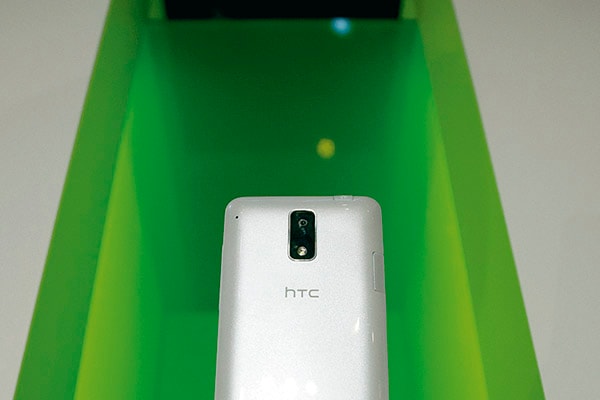The 50 Best Publicly Traded Asia-Pacific Companies
Once again China dominates the list


A slowing economy weeds out the merely good companies from the truly great ones. So this year’s list of the 50 best publicly traded companies in Asia-Pacific is a roll call of outfits that have managed to thrive amid decelerating growth in Asia and all but non-existent growth in their US and European markets.
No company demonstrates this better than Hong Kong’s Noble Group. It’s made the list seven straight years, the longest streak of any company since we started honouring the region’s top performers in 2005. It suffered a rare quarterly loss a year ago, overhauled its management and got back on course.
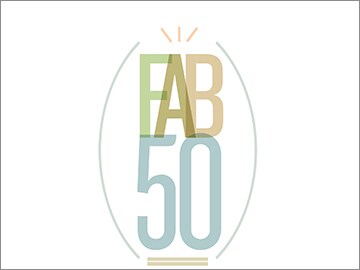
Once again China dominates the list. There are 23 mainland entries, the same as a year ago. Those include snack rivals Tingyi and Want Want—perennial Fab 50 companies. Also making the list are three blue-chip property developers that haven’t been stymied by the rocky real estate market: Returnee China Vanke and first-timers Longfor Properties and Poly Real Estate. A noteworthy newcomer is Gold Mantis Construction Decoration, which has taken full advantage of China’s building bonanza by becoming the go-to company for interior design. We profile this well-managed, fast-growing outfit beginning on the next page.
India claims the second-biggest haul—11 companies, up from seven last year. The big IT software services and consulting firms, HCL and Tata Consultancy, return while a drug company, Sun Pharmaceutical, breaks into the elite ranks for the first time.
Fifteen companies are new this year. Another 10 returned after falling off in past years. That large turnover is what you’d expect when markets are unsettled and the economic direction is uncertain. The result: Several leading names that claimed a spot year after year—such as Australia’s Wesfarmers, India’s Mahindra & Mahindra and Taiwan’s HTC (see p. 116)—failed to repeat this time.
The companies are chosen from a pool of 1,295 that had at least $3 billion in annual revenue or market cap. We look at revenue, earnings, return on capital, share-price movements and the outlook. If one had too much debt or the government owned at least half the shares, it was out. We also don’t consider local offshoots that are majority-owned by a multinational (Nestlé India, for example). The result is the region’s best of the best.
Reporting by Kim Hee-Joung, Anuradha Raghunathan and Heng Shao
Asian Paints
INDIA
CHEMICALS—COATINGS/PAINT
SALES $1.8 BLN
MARKET VALUE $6.3 BLN
Bajaj Auto
INDIA
CONSUMER DURABLES—VEHICLES
SALES $3.7 BLN
MARKET VALUE $8.8 BLN
Belle International Holdings
CHINA
RETAILING—APPAREL/FOOTWEAR
SALES $4.6 BLN
MARKET VALUE $16.2 BLN
Controls more than 50% of the midrange to high-end footwear market in China. Retail network of 16,000 stores spans 300 cities. Agreed in March to a $140 million deal for Big Step, a Nike and Adidas distributor with 600 retail outlets. Launched its first low-end fashion brand, ‘:15 mins’, this year.
Bharti Airtel
INDIA
TECHNOLOGY—WIRELESS TELECOM
SALES $14 BLN
MARKET VALUE $17.9 BLN
Cheng Shin Rubber Industry
TAIWAN
CONSUMER DURABLES—AUTO PARTS
SALES $4 BLN
MARKET VALUE $6.9 BLN
World’s largest bicycle-tire manufacturer and leading producer of automobile tires makes Fab 50 debut. Subsidiary Maxxis International supplies Ford, GM, Toyota and other companies, and sponsors sports teams such as the New York Yankees. Operations in 11 countries on 4 continents have not satisfied its appetite—now eager to reclaim the Indian market by setting up an office this year and a factory in 5 years. Earnings down in last 2 years but demand in China and India make for bright prospects.
China Vanke
CHINA
REAL ESTATE—PROPERTY DEVELOPMENT
SALES $10.8 BLN
MARKET VALUE $14.5 BLN
Real estate giant makes a Fab 50 comeback after skipping 2 years. Averaged more than 60,000 apartment sales annually for last 3 years. Pushed net profits up 25% in the first half, even as rival property outfits saw earnings dip as sector cooled. Designing ‘ultrasmall’ apartments for the young and single signed a $1.9 billion contract with a municipal government to build apartments for the elderly.
Citic Securities
CHINA
DIVERSIFIED FINANCIALS—INVESTMENT SERVICES
SALES $4.2 BLN
MARKET VALUE $18.6 BLN
Country’s largest brokerage and securities firm returns to the list after 2 years off. Raised $1.7 billion on the Hong Kong exchange last October, becoming the first Chinese securities company listed in both the mainland and Hong Kong. Government still owns 26%. Long eager to expand globally, it bought 19.9% of CLSA, a brokerage and investment group stationed in 20 Asian countries.
Cosmos Pharmaceutical
JAPAN
RETAILING—DRUGSTORES
SALES $3.6 BLN
MARKET VALUE $1.7 BLN
Operator of drugstore chain breaks into the list. Net income grew 40% for the year ended May 31. Share price jumped 63% in past year, second highest among Fab 50 companies. Plans to add a record number of roughly 50 large stores to its current network of 463, most of which are dotted over Kyushu, the island where it’s based.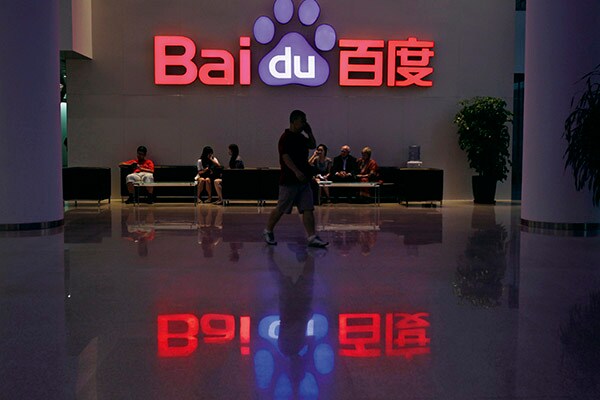 Baidu
Baidu
CHINA
TECHNOLOGY—INTERNET SERVICES
SALES $2.2 BLN
MARKET VALUE $46.8 BLN
New to list, it runs country’s largest search engine. Went public in the US in 2005 at $27 a share. Today the price is $123. Net profit soared 97.4% last year, thanks to growing base of 488,000 online marketing customers. Ended years of music-piracy accusations by launching a new, licenced music platform last year. Hired a record 5,200 employees, mainly in R&D. Also extended dominance over mobile phone searches—Baidu is the default search engine for 85% of Android phones sold in China.
CP ALL
THAILAND
RETAILING—CONVENIENCE STORES
SALES $4.9 BLN
MARKET VALUE $9.8 BLN
Opened 600 7-Eleven convenience stores in Thailand over past year and now boasts 6,700. Only the US and Japan have more. Aims to expand to 10,000 outlets by 2018 to keep profits growing at 15% a year. Market cap jumped 30% in 12 months.
CSL
AUSTRALIA
DRUGS—BIOTECH
SALES $4.8 BLN
MARKET VALUE $21.6 BLN
Makes list for first time since 2008. Started by the government in 1916 as Commonwealth Serum Laboratories and focussed on vaccines. Main business today is products made from blood plasma. Went public in 1994, and now has 10,000 employees in 27 countries.
DiGi.com
MALAYSIA
TECHNOLOGY—TELECOM SERVICES
SALES $1.9 BLN
MARKET VALUE $12.4 BLN
Debuts on the Fab 50 on strength of the best 5-year average return on capital of the 50 companies. Market cap up 59% over past year. Profits reached nearly $400 million last year. Norway’s Telenor owns 49%. Started offering the iPhone in April 2010.
Digital China Holdings
CHINA
TECHNOLOGY—COMPUTER HARDWARE
SALES $9.1 BLN
MARKET VALUE $1.8 BLN
Hardware distributor becoming one of China’s largest IT service providers. Signed deals with 78 Chinese cities so far to supply its ‘Sm@art City Solution’, which sets up e-platforms to ensure that information is secure and to assist communication between government bureaus. The program also provides each citizen with an encrypted government ID card that allows access to public services such as health care.
ENN Energy Holdings
CHINA
UTILITIES—GAS
SALES $2.3 BLN
MARKET VALUE $4.1 BLN
It’s based in economic development zone of Langfang, Hebei Province and takes full advantage of the region’s resources and preferential tax policies. Hong Kong-listed subsidiary XinAo Gas supplies 4.2 million Chinese households and operates natural gas projects in 79 cities in China. Business expanding to the US through a partnership with Duke Energy and a promise to invest $5 billion in solar energy in Nevada.
Geely Automotive Holdings
CHINA
CONSUMER DURABLES—VEHICLES
SALES $3.3 BLN
MARKET VALUE $2.6 BLN
New to the list this year, thanks to average 5-year sales growth of 188% a year—faster than any other Fab 50 company this year. Last year shipped 1,000 taxis to Azerbaijan, made in joint venture with British firm.
Great Wall Motor
CHINA
CONSUMER DURABLES—VEHICLES
SALES $4.6 BLN
MARKET VALUE $7 BLN
Largest manufacturer of SUVs and pick-ups in China returns to the Fab 50. Sales grew by 37% last year exports to more than 100 countries jumped 50%, to 83,000 vehicles. Its entry, SUV brand Haval, came in sixth in the off-road Dakar Rally this year, best-ever finish by a Chinese racing team. Runs ads on giant electronic screen in Moscow near Kremlin, the only independent Chinese auto company to do so.
HCL Technologies
INDIA
TECHNOLOGY—SOFTWARE
SALES $4.2 BLN
MARKET VALUE $6.9 BLN
HDFC
INDIA
BANKING—REGIONAL
SALES $6.5 BLN
MARKET VALUE $25.2 BLN
Hengan International Group
CHINA
PERSONAL PRODUCTS—FEMININE HEALTH CARE
SALES $2.2 BLN
MARKET VALUE $11.8 BLN
Country’s No. 1 tissue and sanitary napkin business, but Procter & Gamble still leads in baby diapers. Third straight time on list. Net profit grew despite significant spike in raw-material prices.
Hisense Electric
CHINA
CONSUMER DURABLES— TELEVISIONS
SALES $3.7 BLN
MARKET VALUE $1.7 BLN
Debuts on list after net income growth of 112% last year, highest of all Fab 50 companies. Founded in 1969 as a radio factory in Qingdao, Shandong Province, it today sells TVs and white goods in 130 countries. Set to invest $60 million in a liquid crystal display project in Guangdong Province. Entered the smart TV market this year.
Hyundai Glovis
SOUTH KOREA
TRANSPORTATION—LOGISTICS
SALES $8.2 BLN
MARKET VALUE $7 BLN
A 28% jump in revenue and 30% rise in net profit last year put it on list for third time in a row. Gets 85% of its revenue from Hyundai-Kia Automotive Group. Looking to add other automakers. Hyundai heir Chung Eui-Sun owns 32%, which makes up most of his $3.1 billion fortune.
Indorama Ventures
THAILAND
CHEMICALS—SPECIALISED
SALES $5.9 BLN
MARKET VALUE $4.7 BLN
Makes list for first time since going public in 2010. Manufactures PTA, used in polyester yarns and fibres, and PET, used for beverage containers. Expects $8 billion in sales this year, though lower prices in Asia are cutting analyst estimates. Gets 38% of sales in North America, its biggest market. One-third owned by billionaire Aloke Lohia.
Inner Mongolia Yitai Coal
CHINA
MATERIALS—COAL
SALES $2.8 BLN
MARKET VALUE $8.8 BLN
Fab 50 newcomer leads Inner Mongolia’s coal industry with a reserve of 2.8 billion tonnes. President Zhang Shuangwang was a former civil servant who set up company as state-owned enterprise in 1988. Listed in Shanghai in 1997, it ended state ownership in 2001. Raised $900 million in July on the Hong Kong exchange, the market’s second-biggest deal this year. Set to absorb small coal companies in Erdos, Inner Mongolia under local government’s plan to restructure industry. Funded construction of hundreds of miles of railways across China.
ITC
INDIA
AGRICULTURE—TOBACCO
SALES $5.2 BLN
MARKET VALUE $36.9 BLN 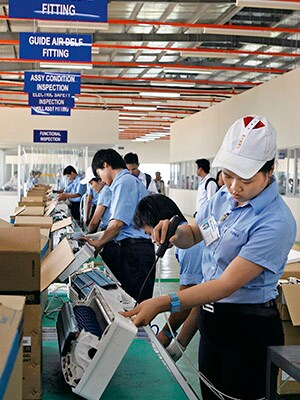 Gree Electric Appliances
Gree Electric Appliances
CHINA
CONSUMER DURABLES—AIR CONDITIONERS
SALES $13.3 BLN
MARKET VALUE $9.7 BLN
Makes list for the fifth time after a 43% jump in sales last year. Sales growth slowed to 20% in the first half of 2012 but should pick up steam as the government renews its energy-saving subsidy programme. Raised $515 million through a share offering in January to fund technology development and new production bases. Considering a US plant after opening an office in California last year.
Kotak Mahindra Bank
INDIA
BANKING—REGIONAL
SALES $2.6 BLN
MARKET VALUE $7.9 BLN
Lenovo Group
CHINA
TECHNOLOGY—COMPUTER HARDWARE
SALES $29.6 BLN
MARKET VALUE $9 BLN
After missing last year it’s back in the Fab 50, making a sixth appearance in the list’s 8 years. Its 14.7% world market share for PCs makes it No. 2 in the world, behind HP. Launched a joint venture with Japanese PC firm NEC, opening door to world’s third-largest PC market. Its Ideal-Pad Yoga, a laptop that converts to a tablet by rotating its screen, is selling well. Sales rose 37.2% for fiscal 2012, but net profit soared 73.4%, to $473 million. Will pour $800 million into new industrial base in Wuhan combining R&D, production and sales of mobile products.
LG Household & Health Care
SOUTH KOREA
PERSONAL PRODUCTS—COSMETICS/TOILETRIES
SALES $3 BLN
MARKET VALUE $8.3 BLN
A Fab 50 repeat this year after debuting last year. Market cap rose 22% over past year, while last year revenue rose 18% and net profit 11% to $228 million. Acquired Japanese cosmetics company Ginza Stefany early this year after buying Haitai Beverage last year and FaceShop cosmetics chain in 2010.
Li & Fung
HONG KONG
TRADING COMPANIES—CONSUMER GOODS
SALES $20.1 BLN
MARKET VALUE $13.8 BLN
Seven-year Fab 50 star returns after a break last year. Manages supply chain of 15,000 manufacturers in 40 countries. Under its famously aggressive acquisition model, it snapped up 22 companies in the past 18 months, including suppliers of US retail chains Macy’s, Aéropostale and J.C. Penney. Historically focussed on Europe and the US, it’s slowly shifting to China and the rest of Asia as consumption rises there. First-half profit from continuing operations dropped 22% as global economic growth slowed. Stock sank but then rebounded as bargain-hunters saw a cheap blue chip.
Longfor Properties
CHINA
REAL ESTATE—PROPERTY DEVELOPMENT
SALES $3.8 BLN
MARKET VALUE 7.7 BLN
Fresh to list, it passed $1 billion in net profit last year with 60% jump. Revenue soared 67%. Runs 55 projects in 14 cities and expanded inventory by 1,200 acres. Despite tightened housing regulations and cooler economy, strong appetite for real estate in its Chongqing base saw land sales double in last quarter. Longfor joined the rush by acquiring more than 200 acres for $665 million last month.
NHN
SOUTH KOREA
TECHNOLOGY—INTERNET SERVICES
SALES $1.8 BLN
MARKET VALUE $11.1 BLN
Fourth straight year on list. Combination of search engine Naver and game portal Hangame has been key to success for 13 years. Next cash cow could be mobile messenger Line, which has 54 million subscribers after only 14 months half are in Japan. Its search advertising revenue from PCs growing more slowly but mobile ad revenue becoming more meaningful each quarter—company expects mobile ad revenue to reach $89 million this year.
Olam International
SINGAPORE
FOOD—AGRICULTURAL PRODUCTS
SALES $12.9 BLN
MARKET VALUE $3.9 BLN
Makes the list for third time—first time since 2010. World’s largest supplier of cashews and sesame seeds, and among leaders in coffee, cocoa, rice, cotton and wood products. Revenue up 22% for 12 months ended March 31.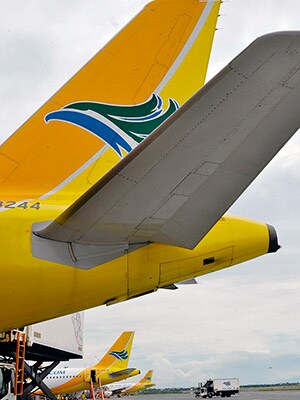 JG Summit Holdings
JG Summit Holdings
PHILIPPINES
CONGLOMERATE—FOOD
SALES $2.8 BLN
MARKET VALUE $5.4 BLN
Returns to list after debut last year. Its expected 50% EPS growth next year is the highest of the 50. Market cap grew by 38% over past 12 months. Owns two-thirds of Cebu Pacific Air, and stakes in banking, telecom, petrochemical, food manufacturing and real estate businesses.
Poly Real Estate Group
CHINA
REAL ESTATE—PROPERTY DEVELOPMENT
SALES $7.5 BLN
MARKET VALUE $11.2 BLN
Cracks Fab 50 for first time on strength of 39% jump in net profit to $1 billion last year. Spent $471 million in July for 159 acres of land in 3 Chinese cities. Lower housing prices and new policies curbing property speculation contribute to a 12% drop in net profit for first half of 2012. Government owns 43%.
Qingdao Haier
CHINA
COSUMER DURABLES—APPLIANCES
SALES $11.7 BLN
MARKET VALUE $4.3 BLN
World’s largest electric home-appliance brand returns after debuting last year. Close to 1,300 Haier products qualified for energy-saving subsidy programme government started June 1, which should boost this year’s sales. Launched Haier Super Flagship smartphone with Chinese computer security software developer. Government owns 46.5%.
Quanta Computer
TAIWAN
TECHNOLOGY—COMPUTER HARDWARE
SALES $36.6 BLN
MARKET VALUE $9.9 BLN
New to list, this laptop manufacturer boasts partnerships with top 10 PC companies in the world. Market value rose 37% over past year. Already No. 1 in its industry by market share, it also strives to be top non-Apple tablet-maker, with deals to produce Amazon’s Kindle Fire 2s and Google’s Nexus. Expects 70% jump in shipments to more than 6 million this year.
Samsung Electronics
SOUTH KOREA
TECHNOLOGY—SEMICONDUCTORS
SALES $142.4 BLN
MARKET VALUE $166.4 BLN
Made the first Fab 50 list in 2005 and now returns for an encore. Biggest company on list by far in market cap, sales and profits. Smartphones are driving growth, especially its Galaxy and Galaxy Note, more than off-setting poor earnings from traditional semi-conductor business. Could earn 64% of its operating profit from the information and communications sector this year. One cloud: Apple’s lawsuit charging it with patent infringement
Sany Heavy Industry
CHINA
CAPITAL GOODS—HEAVY EQUIPMENT
SALES $8.1 BLN
MARKET VALUE $13.8 BLN
Makes fourth appearance on list after post- ing 61% hike in net income, to $1.37 billion last year. Headquartered in Changsha, the manufacturer exports to more than 110 countries. Listed in Shanghai, it recently shelved a $2 billion share offering in Hong Kong because of the weak market. Booked sales growth of only 5.2% in the first quarter and largely because it extended more credit to customers. Acquired German concrete equipment manufacturer Putzmeister Holdings for $425 million.
Sun Pharmaceutical Industries
INDIA
DRUGS & BIOTECHNOLOGY—PHARMACEUTICALS
SALES $1.6 BLN
MARKET VALUE $12.3 BLN
Suzhou Gold Mantis Construction Decoration
CHINA
CONSTRUCTION—ENGINEERING SERVICES
SALES $1.6 BLN
MARKET VALUE $5 BLN
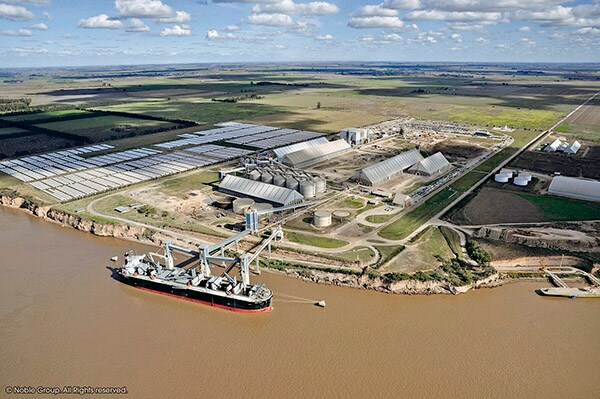
Noble Group
HONG KONG
CONGLOMERATE—AGRI/INDUSTRIAL PRODUCTS
SALES $80.9 BLN
MARKET VALUE $6.5 BLN
Makes the list for seventh straight time, the longest Fab 50 streak. Asia’s largest commodities trading firm surprised analysts with third-quarter loss of $17.5 million last year, stalling plans for listing its $5 billion agriculture business. This year things are turning around with 39% net profit surge in second quarter a new CEO, Yusuf Alireza and expected gain of $800 million from merger and sales deals involving 2 subsidiaries.
Tata Consultancy Services
INDIA
TECHNOLOGY—IT SERVICES
SALES $9.6 BLN
MARKET VALUE $44.9 BLN
Tata Motors
INDIA
consumer durables—vehicles
SALES $32.6 BLN
MARKET VALUE $12.7 BLN
Tencent Holdings
CHINA
TECHNOLOGY—INTERNET SERVICES
SALES $4.5 BLN
MARKET VALUE $59.4 BLN
Country’s largest web service portal makes list for fourth time. A 46% growth in internet add-on services, mainly online gaming, drove 32.7% rise in net profit, to $1.6 billion. Surge in number of Chinese internet users to 513 million certainly helps. Users of Weixin, its free voice and text-messaging software, exceeded 100 million last year. Forging a partnership with Walt Disney to boost China’s limping animation industry.
Tingyi Holding
CHINA
FOOD—SPECLIALTY
SALES $7.9 BLN
MARKET VALUE $15 BLN
No. 1 packaged-food producer in China returns for fifth appearance in a row. Net profit declined 11.8% last year due to rising costs and slow growth in the beverage business. A Tingyi-PepsiCo alliance allows a subsidiary to become a PepsiCo franchise bottler. Tingyi is also setting up a snack food joint venture with Japanese producers Calbee and Itochu.
Titan Industries
INDIA
RETAILING—JEWELRY
SALES $1.7 BLN
MARKET VALUE $3.5 BLN
See story, p. 125.
Want Want China Holdings
CHINA
FOOD—SPECIALTY
SALES $3 BLN
MARKET VALUE $16.2 BLN
Produces flavoured milk, popsicles, snacks and fried rice cakes in Taiwan and China. Makes list for fourth time. Sales grew 31% last year and net profits 17%. Want Want also owns media conglomerate China Times News Group and has received regulatory approval to purchase 60% of Taiwan’s largest cable operator.
WorleyParsons
AUSTRALIA
CONSTRUCTION—ENGINEERING SERVICES
SALES $6 BLN
MARKET VALUE $6.7 BLN
Makes the Fab 50 for second straight year. Focusses on energy industry.
Zhongsheng Group Holdings
CHINA
RETAILING—VEHICLES
SALES $6.7 BLN
MARKET VALUE $2.4 BLN
Operates 150 midrange to high-end automobile dealerships across China. Returns to list after debuting last year as sales soared 82% and net income 44%. Last year opened 18 dealerships and made 24 acquisitions. In May purchased 70% stake in German car-tuning company Carlsson Autotechnik, which will work with Zhongsheng to sell customised luxury Mercedes.
Zoomlion Heavy Industry
CHINA
CAPITAL GOODS—HEAVY EQUIPMENT
SALES $7.4 BLN
MARKET VALUE $10.5 BLN
Earns a place on the list for the third straight time with an 81% spike in net profit last year. The world’s seventh-biggest heavy industrial equipment company, it plans to add a production center in Japan, a manufacturing plant in the US and an R&D facility in South America. Will invest $727 million in 2 industrial parks in Changde City, Hunan Province. Net income growth slowed to 3.2% in the first quarter as investment in China fell.
Of the 25 companies that fell off the Fab 50 list since last year, four-time awardee HTC had one of the hardest landings. For the fourth quarter of 2011 the Taiwanese smartphone producer suffered its first year-on-year drop in net profit in two years. The first quarter of 2012 saw sales drop by 36% and net profit by 68% second-quarter sales were down 28%, accompanied by a 58% dip in net profit. Last month HTC said it lost $40 million on an investment in cloud gaming service OnLive.
While HTC’s share in the global cellphone market is 2.2%, its major rival in the Android arena, Samsung, held 21.6% of the market in the second quarter, up from 17.8% in the third quarter of 2011. Apple launched its iPhone 4S and gained a 6.9% market share. The huge popularity of iPhones in the US has hammered HTC’s sales. Chief Executive Peter Chou says, the days when half of HTC’s sales came from the US are gone forever. Further straining its performance was a series of patent infringement lawsuits, which held up shipments of HTC phones. Challengers include Apple and Nokia The company’s biggest hope China, sees fierce competition. Apple's iPhone and Samsung’s Galaxy aside, domestic brands such as ZTE, Huawei, Lenovo and Xiaomi have been very strong. In two years Huawei became No. 3 in China with an 11% market share. HTC has just 2.7%. Rising star Xiaomi has been cutting prices on its older models, presenting another threat to HTC in the midrange market. —Heng Shao
First Published: Oct 04, 2012, 06:32
Subscribe Now